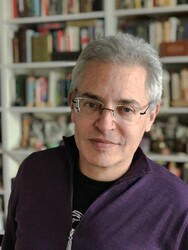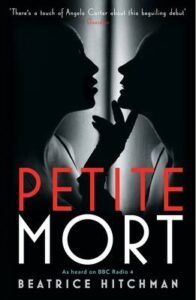John Oakes: The Fast: The History, Science, Philosophy, and Promise of Doing Without
March 2, 2024 by David
Filed under Non-Fiction, WritersCast
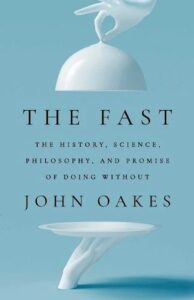 The Fast: The History, Science, Philosophy, and Promise of Doing Without—John Oakes—Avid Reader Press / Simon & Schuster—Hardcover —9781668017418—320 pages—$30—February 13, 2024—ebook versions available at lower prices
The Fast: The History, Science, Philosophy, and Promise of Doing Without—John Oakes—Avid Reader Press / Simon & Schuster—Hardcover —9781668017418—320 pages—$30—February 13, 2024—ebook versions available at lower prices
If you’re expecting to find a “how to guide to fasting” you will have to look elsewhere. John Oakes is far too good a writer and thinker to spend his time writing something simple like a guide book or even a “rah rah” tome aimed at encouraging you to take up the idea of “intermittent fasting” for yourselves. You might decide to try it out after reading The Fast, but that’s not his purpose and not why you should want to read this book. If you are already engaged in fasting, you should read this book. Perhaps it will be most especially useful during the meditative moments while you are in the midst of your own fast.
Oakes is more interested in a deeper approach to this practice, giving it historicity and enabling us to explore for ourselves how denial of a core bodily function can alter consciousness and help us better understand ourselves. This kind of antidote to the habits of modern life does have an appeal to many of us, but even if you are not going to be a practitioner, you will find yourself captivated, as he is, by the science, history, philosophy and spiritual background of fasting and the denial of physical needs. For Oakes, the ideas and the connection to human spirituality are as important as the specific practices themselves. I’m glad of that, as it makes reading this book that much more rewarding to engage with.
I will also note that Oakes, who has been an editor and publisher for many years, is a really terrific writer and therefore you can read this book for the pleasure good writing affords. As I am sure many of you who listen to this podcast have noticed, there are a lot of badly written books out there and no one wants to spend their limited time reading them. Given the vast number of choices of what to read, it is a particular joy to discover a really good writer. Bravo Oakes for spending a lifetime learning how to write, and bravo Avid Reader Press for publishing this book. I hope you will consider reading it yourself after you listen to our conversation here. Whether you decide to fast or not. For myself, much as I like this book, I am happier eating than not, even if it is an indication of my generally shallow approach to spirituality.
I’ve known John Oakes for a number of years through our mutual involvement in independent publishing. He is currently the publisher of The Evergreen Review. He is also editor-at-large for OR Books, which he cofounded in 2009. OR has been a singularly contrarian publisher for many years, built to demonstrate an alternative approach to traditional reliance on a certain popular online bookseller. Oakes has written for a variety of publications and The Fast is his first book.
We had alot of fun talking together about John’s book. Enjoy…
Podcast: Play in new window | Download
Publishing Talks Interview with Jane Friedman of Hot Sheet
December 28, 2023 by David
Filed under Ebooks and Digital Publishing, Publishing History, PublishingTalks, The Future
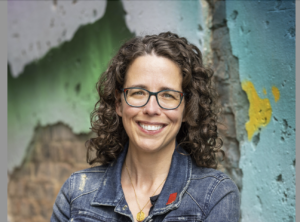 Publishing Talks began first as a series of conversations with book industry professionals and others involved in media and technology, mostly talking about the future of publishing, books, and culture. It was great fun talking with people in the book industry about the evolution of publishing in the context of technology, culture, and economics. Over the years, I talked with a variety of editors, publishers and others, innovators and leaders in independent publishing and bookselling in the past, and into the present.
Publishing Talks began first as a series of conversations with book industry professionals and others involved in media and technology, mostly talking about the future of publishing, books, and culture. It was great fun talking with people in the book industry about the evolution of publishing in the context of technology, culture, and economics. Over the years, I talked with a variety of editors, publishers and others, innovators and leaders in independent publishing and bookselling in the past, and into the present.
These conversations have been inspirational to me. I have had the pleasure of speaking with people who have influenced and changed contemporary literature and culture. I’ve also had the opportunity to speak with a number of friends and colleagues in the book business, always trying to explore and understand the complex web of books, authors and readers that is at the heart of our evolving culture.
Every year, ever more new books are published, and the “rules of the game” evolve faster than most of us can keep up. Given the pace of change in the book industry, I could not think of anyone better to learn about the latest trends and developments than Jane Friedman, whose insights and breadth of knowledge are unmatched among industry observers. I first spoke with her in 2015 and then again in 2022, and I always learn a great deal from her in every conversation we have.
Jane publishes a bi-weekly industry newsletter, a must-read for anyone involved with publishing, called The Hot Sheet. Her most recent book is The Business of Being a Writer (University of Chicago Press). Collaborating with The Authors Guild, she wrote The Authors Guild Guide to Self-Publishing. In 2023, Jane was awarded Publishing Commentator of the Year by Digital Book World.
You might also have heard of Jane because of her experience with AI book fraud, which she wrote about in August 2023. She has put together a roundup of the extensive coverage and interviews about what happened, which you can explore here.
And she publishers yet another newsletter for writers and creators called Electric Speed, which is also worthwhile subscribing to.
Her website offers a wide range of services and information for writers: “I report on the book publishing industry and help authors understand the business. I’ve been working in book publishing since the 1990s, but my views are not from the 1990s. Amidst rapid change in the industry, writers need honest and unbiased guidance to make the best decisions for their careers. I hope to offer you a signal amidst the noise.”
Jane Friedman is a very busy woman, I am truly grateful that she was able to take some time to talk to me about the latest goings on in publishing.
Writerscast began in 2008! Thanks to all who have participated and all of you who have listened to this series over the past 15 years. It’s been fun.
Podcast: Play in new window | Download
Baron Wormser: The Road Washes Out in Spring
October 7, 2023 by David
Filed under Non-Fiction, WritersCast
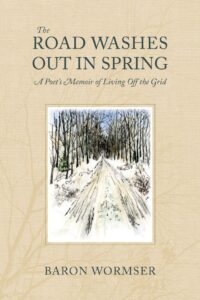 The Road Washes Out in Spring: A Poet’s Memoir of Living Off the Grid – Baron Wormser – Brandeis University Press – 9781684581603 – 214 pages – paperback – $24.95 – March 7, 2023 – ebook versions available at lower prices
The Road Washes Out in Spring: A Poet’s Memoir of Living Off the Grid – Baron Wormser – Brandeis University Press – 9781684581603 – 214 pages – paperback – $24.95 – March 7, 2023 – ebook versions available at lower prices
Baron Wormser is a poet and prose writer whose work I have been familiar with for many years. Back in the 1970s, he and his wife Janet, moved to rural Maine as part of the “back to the land” wave that had been inspired by hippies and the Stewart Brand’s influential Whole Earth Catalog and especially the writings of the now almost mythic Helen and Scott Nearing, vegetarians who pioneered simple living in the 1930s and 40s.
His memoir of that time was originally published almost twenty years ago and now there is a new edition of this meditative, almost poetic narrative of simple living.
Baron and his family lived in a house they built in Maine with no electricity or running water. Much like the Nearings, they raised (and canned) much of their own food, carried water from their well, and read through the long winter nights by the light of kerosene lamps.
As Wormser states early in this book, living off the grid was not meant to be a statement of anything. In fact, as complete novices to the life they set out to live, it turned out that they had built their house in a place that there was no electricity and initially they could not afford to pay to have power lines run to their house. As time went on, they embraced the simplicity of their rural lives and learned from their experienced neighbors, for whom life was not a choice and “lifestyle” would have been a meaningless term.
Wormser refuses any simple understanding or explanation for the lives he and his wife chose for the twenty five year period during which they raised their children and became integral to the local community. He writes about nature and the simple life without sentimentalizing anything, appreciates the good and faces the difficulties head on without failing to note the complexity of everything we prefer to think of as simple. He is a careful thinker and writer, and his poetic self is a presence at all times. Here is a lovely excerpt from the book:
If there is such a thing as a mutable eternity, it is snow falling in the woods. I am thinking of a windless, steady plummeting. Nothing is moving except for snowflakes. You can hear the snow faintly ticking on the pine needle branches. You can hear it descending—a soft sift of air. You are held in the hand of something enormous yet gentle, something extraordinary yet calming, something evanescent yet quite palpable (from a Latin word meaning “to touch gently”). Every surface receives the snow in its way. A large, fallen, curled maple leaf collects the snow in its center. A boulder”s stored heat resists the snow at first. Then its surface turns wet as if it were raining. Then with un-boulder-like delicacy a thin frizz accumulates. On top of the garden gate a fragile white skein begins to perch. Little, almost derby-like hats grow on the garden fence posts. The mown grass around the house fills in gradually. The stiff, frozen blades seem like little heights. Then the snow, as it mounts, receives itself. Another landscape is created and for months we live in that landscape.
When I was in my twenties, I shared the impulse to “head for the country,” where I tried and failed to make a go of living on the land. I greatly admire and appreciate what the commitment that Baron and his family made to live in Maine for a quarter century. And it was a deep pleasure to read this memoir of that time.
In 2000 Baron was appointed Poet Laureate of Maine by Governor Angus King. He currently resides in Montpelier, Vermont, with his wife. In 2009 he joined the Fairfield University MFA program. He works in schools with both students and teachers. Wormser has received the Frederick Bock Prize from Poetry and the Kathryn A. Morton Prize along with fellowships from Bread Loaf, the National Endowment for the Arts and the John Simon Guggenheim Memorial Foundation. In 2000 he was writer in residence at the University of South Dakota. Wormser founded the Frost Place Conference on Poetry and Teaching and also the Frost Place Seminar. His most recent book of poetry is The History Hotel, published by CavanKerry Press.
In other rooms and beyond those rooms
So much was occurring that went on happily
And unhappily, indifferent to protocols,
Brimming with anemones, half-heard melodies,
Averted glances.
(from “Elegy for the Poet Adam Zagajewski”)
Buy The Road Washes Out in Spring
Podcast: Play in new window | Download
S.C. Gwynne: His Majesty’s Airship interview by David Wilk
August 28, 2023 by David
Filed under Non-Fiction, WritersCast
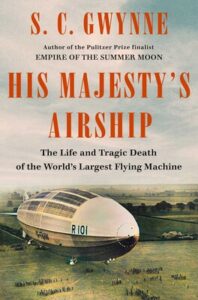 His Majesty’s Airship: The Life and Tragic Death of the World’s Largest Flying Machine — Sam Gwynne — Scribner — 9781982168278 — 320 pages — hardcover — $32.00 – May 2, 2023 — ebook versions available at lower cost
His Majesty’s Airship: The Life and Tragic Death of the World’s Largest Flying Machine — Sam Gwynne — Scribner — 9781982168278 — 320 pages — hardcover — $32.00 – May 2, 2023 — ebook versions available at lower cost
Sam Gwynne is the author of the outstanding Empire of the Summer Moon, a book I really loved. In this new work, he tells the story of a very different sort, documenting the British airship R101, but covering essentially the entire rise and fall of “lighter than air” powered flight. Like so many other airships, R101 crashed horribly in 1930 and killed almost its entire crew, including the leadership of the British airship industry, which at the time still hoped for an empire conquering means of travel. It was a massive case of a foolish, hubristic belief in something that could never succeed. It’s tempting to view this disaster as symptomatic of an empire in decline.
At least for a time, airships were a symbol of the future. R101 was, in fact, the largest aircraft ever to have flown and the product of what appeared to be advanced engineering. Somehow its supporters simply failed to recognize that these massive, hydrogen fueled, uncontrollable flying structures were bound to fail.
There is a captivating cast of characters at hand, including German inventors, well-to-do aristocrats to brilliantly flawed engineers, alcoholic flyers and even a Romanian princess and her doomed romance with the leader of the British airship program.
Gwynne is a masterful storyteller and is able to bring a previously obscure piece of twentieth century history to life for modern readers. It was a pleasure to speak with him about this book, his working methods as a writer of history, and a range of other topics as well. I’m looking forward to reading Sam’s next book, on any subject he cares to write about. He is that good a writer.
S.C. “Sam” Gwynne is the author of acclaimed books on American history: Empire of the Summer Moon and Rebel Yell: The Violence, Passion, and Redemption of Stonewall Jackson, Hymns of the Republic: The Story of the Final Year of the American Civil War, and The Perfect Pass: American Genius and the Reinvention of Football. He grew up in Connecticut, went to Princeton and Johns Hopkins, and now lives in Austin, Texas.
Sam has written for Texas Monthly and for Outside magazine. He was a Correspondent, Bureau Chief, National Correspondent and Senior Editor for Time Magazine and has also written for the New York Times, Harper’s, Los Angeles Times, San Francisco Chronicle, California Magazine, Boston Globe, Dallas Morning News, and other publications.
Buy the book from Bookshop.org
“Aviation history is nothing less than miraculous; it took a mere sixty-three years, after all, to get from the Wright brothers to Neil Armstrong. Barely a century ago, however, our skies were filled with a bounty of gliders, biplanes, and flying boats; balloons, blimps, and zeppelins. With His Majesty’s Airship, the inimitable Mr. Gwynne explores in vivid detail how this dream bloomed, and how it, in time, fell tragically to earth. He has written both a remarkable history and an eye-opening revelation of technology’s recurrent phantasms.” — Craig Nelson, award-winning author of Pearl Harbor and Rocket Men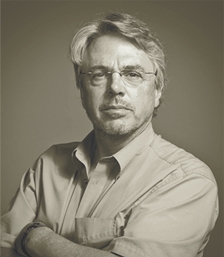
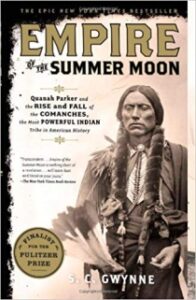
Podcast: Play in new window | Download
Publishing Talks: An Interview with Shouvik Paul of CopyLeaks
July 27, 2023 by David
Filed under PublishingTalks, Technology
 Publishing Talks began as a series of conversations with book industry professionals and others involved in media and technology, mostly talking about the future of publishing, books, and culture. I’ve spent time talking with people in the book industry about how publishing is evolving in the context of technology, culture, and economics.
Publishing Talks began as a series of conversations with book industry professionals and others involved in media and technology, mostly talking about the future of publishing, books, and culture. I’ve spent time talking with people in the book industry about how publishing is evolving in the context of technology, culture, and economics.
Later this series grew to include conversations that go beyond the future of publishing. In an effort to document the literary world, I’ve talked with a variety of editors, publishers and others who have been innovators and leaders in independent publishing in the past and into the present.
These conversations have been inspirational to me on many levels. I have gotten to speak with visionaries and entrepreneurs, as well as editors and publishers who have influenced and changed contemporary literature and culture. I’ve also had the opportunity to speak with a number of friends and colleagues I have met over the many years I have been in the book business.
I met Shouvik Paul a number of years ago when he was working for SharedBook, a company for whom I did some consulting work. He is a really smart guy and has been involved in a variety of technology related start ups during his career. Shouvik is currently the Chief Operating Officer of Copyleaks Inc., an award-winning AI-based text analysis company whose primary work is to identify potential plagiarism and paraphrasing across nearly every language, detect AI-generated content, and provide generative AI governance and compliance solutions. For obvious reasons, this kind of technology will be of interest to all kinds of publishers and content owners.
CopyLeaks has been working in AI for years, and now that AI in many different applications will become crucial for the book industry to understand and apply, I thought this would be a great opportunity for me and for Publishing Talks listeners to learn more about where this is all headed from someone who knows alot more than most of the rest of us.
I think this conversation will spur your thinking in a variety of ways. It certainly has inspired me to learn more about AI and how it can be used, what the risks of using it are, and how we need to think about AI both within the book business and in our overall culture. Don’t be surprised if this changes your outlook on the way AI will affect our business and hopefully it will inspire you as to learn more about it as well. The book industry cannot afford not to recognize how this technology will change our lives in so many ways.
Shouvik lives in Manhattan with his two daughters; he wanted me to note here that they refer to him as “That guy who has to stop and pet every dog that passes by” — which is a pretty great recommendation, in my view.
Podcast: Play in new window | Download
Cornelia Maude Spelman: Missing: A Memoir
October 25, 2022 by David
Filed under Non-Fiction, WritersCast
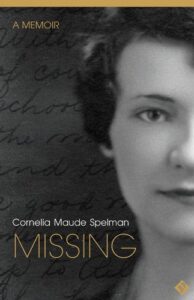 Missing: A Memoir – Cornelia Maude Spelman – Jackleg Press – 9781737513445 – Paperback – 176 pages – $17.00 – July 15, 2022 – ebook versions available at lower prices
Missing: A Memoir – Cornelia Maude Spelman – Jackleg Press – 9781737513445 – Paperback – 176 pages – $17.00 – July 15, 2022 – ebook versions available at lower prices
Cornelia Maude Spelman is best known as a children’s book author. This memoir of her family was spurred by her meeting with and friendship with the late New Yorker editor William Maxwell (himself an extraordinary writer as well), who knew her parents in the 1920s when they were at the University of Illinois together.
Cornelia plainly admired and enjoyed the company of Maxwell, but also was fascinated that he knew her parents before they had children, before their lives went in different directions than Maxwell’s. At one of her meetings with him, she suggests that her parents’ lives were not successful in the terms they had hoped for. Maxwell gently tells her that “in a good novel one doesn’t look for a success story, but for a story that moves one with its human drama and richness of experience.”
It was Maxwell who prompted Cornelia to explore and tell the story of her parents. This memoir tells that story. Spelman spent years exploring the history of her family. It’s a wonderful exploration, full of side trips and thoughtful reflections, and much that anyone interested in the mysteries of their family members will appreciate. Superman was luckier than most of us, in that she was able to meet with people who knew her parents when they were young. Most of us get interested in these stories far too late in our own lives to be able to talk to people who actually knew our older family members, or who, if still around, can remember anything meaningful to tell us.
Spelman’s research is extensive too. She goes to Iowa and Illinois to track down places and information details of her family history and to find people who know something about her parents and their parents. She recounts letters and interviews, even finding medical records and telegrams to help fill out stories that would otherwise be invisible or lost. Importantly Spelman is able to reconstructs her mother’s life and death, as well as that of her long lost brother. Cornelia’s writing is excellent and her storytelling compelling, so that even though we are not connected to the people about whom she writes, we can feel how she feels about them and about herself as she searches out and tells these “missing” family stories.
Cornelia is always honest with us about her disappointments, as well as what she learns that brings her joy and closure as well. This book is warm, profound, and honest. At the end, we know there is still much that will always be missing, but so much more that has been found.
Cornelia Maude Spelman, MSW, was a family therapist before she became a writer and artist. She’s written eleven books for children that help them manage emotions and difficult life situations. Her The Way I Feel series of books for young children has sold several million copies and been translated into Chinese, Korean, Spanish, Greek, Japanese, German, Arabic, Turkish, Danish, and Russian. Cornelia has earned awards from the Illinois Arts Council and was awarded the Bernard De Voto Fellowship in Nonfiction at Bread Loaf Writers’ Conference. This is her first book for adult readers.
It was truly a pleasure to speak with her about this book and her journey to write it.
Podcast: Play in new window | Download
Beatrice Hitchman: All of You Every Single One
September 14, 2022 by David
Filed under Fiction, WritersCast
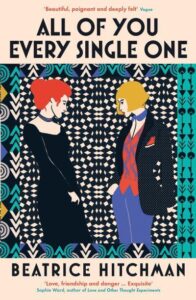 All of You Every Single One: A Novel – Beatrice Hitchman – Overlook Press – 978-1-4197-5693-1 – Hardcover – 320 pages – $26 – January 4, 2022 – ebook editions available at lower prices
All of You Every Single One: A Novel – Beatrice Hitchman – Overlook Press – 978-1-4197-5693-1 – Hardcover – 320 pages – $26 – January 4, 2022 – ebook editions available at lower prices
This novel is an absolutely riveting book I truly enjoyed. And happily, it introduced me to the work of Beatrice Hitchman, who is a wonderful writer. Her story begins in 1910 with Julia Lindqvist, who is unhappily married to a well known Swedish playwright. She leaves him after falling passionately in love with a captivating Austrian woman, a tailor named Eve. Together, they escape to the much less restrictive environment of Vienna, where the story unfolds over the course of 35 years, against the backdrop of the progressive period between the wars, the couple’s close-knit group of unusual friends, Julia’s analysis by Freud, and then later, the difficult period leading up to and including World War II.
Julia and Eve create a lifelong partnership and live as a couple. With the help of their friend, Frau Berndt, they form a network of supportive friends and neighbors. The narrative shifts between Julia, Eve, and the other key people in their network.
I felt that the beginning of the book does not prepare us for all that will follow, and there were times when I could not keep track of all the characters and the storyline. And I’d say that the ending is perhaps the weakest part of the novel. But the author’s language carried me forward, and her characters have stayed with me still. This book will reward you with its depth throughout.
This is Beatrice Hitchman’s second novel. Her first, Petite Mort, was published in 2013 by Serpent’s Tail. She was born in London and has lived in Hong Kong, Edinburgh and Paris. Beatrice is a Lecturer in Creative Writing at the University of Brighton. Her research focuses on contemporary queer fiction, the ethics of historical fiction, writing the remote past, and the endings/closure events of novels (which certainly comes through in this novel!)
You can visit her website here. Buy her book here.
I loved talking to Beatrice about her novel and hope you will enjoy hearing our conversation.
Podcast: Play in new window | Download
Publishing Talks: Interview with Mark Hurst of Creative Good
July 17, 2022 by David
Filed under Ebooks and Digital Publishing, PublishingTalks, Technology, The Future
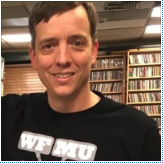 Publishing Talks began as a series of conversations with book industry professionals and others involved in media and technology, mostly about the future of publishing, books, and culture. I’ve spent time talking with people in the book industry about how publishing is evolving in the context of fast-changing technology, culture, and economics.
Publishing Talks began as a series of conversations with book industry professionals and others involved in media and technology, mostly about the future of publishing, books, and culture. I’ve spent time talking with people in the book industry about how publishing is evolving in the context of fast-changing technology, culture, and economics.
Along the way, this series broadened to include conversations that go beyond the future of publishing. In an effort to document the literary world, I’ve talked with a variety of editors, publishers and others who have been innovators and leaders in independent publishing in the past and into the present.
These conversations have been inspirational to me on many levels. I have gotten to speak with visionaries and entrepreneurs, as well as editors and publishers who have influenced and changed contemporary literature and culture. I’ve also had the opportunity to speak with a number of friends and colleagues I have met over the many years I have been in the book business.
The latest visionary is Mark Hurst, who founded and operates Creative Good, a New York-based consultancy and creative platform. Mark has spent his career writing, speaking, and advising teams about how to create better products and services. I’ve been reading his impressive writing for years, and have long admired his thinking and approach to technology, culture, and human behavior. Much of what he writes and talks about can be applied to the publishing industry, especially as it relates to powerfully centralized tech companies like Amazon, Apple, and Google.
Along the way, the very creative Hurst also created the useful and cool Good Todo mobile productivity platform, the world’s first cross-platform todo list, which he described in his first book, Bit Literacy, in which he introduced the “empty inbox” method of managing email (now better known as Inbox Zero – a practice I try to follow daily with mixed success).
Mark also hosts Techtonic – see techtonic.fm – a weekly FM radio show on WFMU. Here’s the Techtonic podcast.
His book Customers Included describes how teams and organizations can create successful products and strategies by including customers, a practice I have often thought publishers could benefit from applying to marketing matters.
Brooklyn 1776, the educational mobile videogame by Hurst and the Creative Good team, won the 2016 Brooklyn Innovation Award for best indie video game.
Mark earned both a bachelor’s and a master’s degrees in computer science from MIT. He lives in New York City with his wife and son.
It was great fun for me to have the opportunity to speak with Mark for this Publishing Talks series on Writerscast. We talked about a wide range of issues that should be of interest to anyone interested in current publishing and media technology matters.
Website: creativegood.com
Email: mark@creativegood.com

Podcast: Play in new window | Download
Robert Child: Immortal Valor: The Black Medal of Honor Recipients of World War II
May 26, 2022 by David
Filed under Non-Fiction, WritersCast
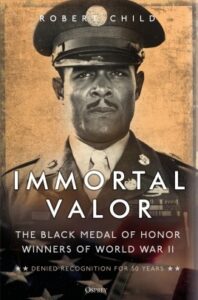 Immortal Valor: The Black Medal of Honor Recipients of World War II – Robert Child – Osprey – 9781472852854 – 288 pages – hardcover – $30 – January 11, 2022 – ebook edition available at lower prices
Immortal Valor: The Black Medal of Honor Recipients of World War II – Robert Child – Osprey – 9781472852854 – 288 pages – hardcover – $30 – January 11, 2022 – ebook edition available at lower prices
It is remarkable to realize how few medals of honor were awarded for service during World War II – there were 432 Congressional medals given out of the over sixteen million men and women who served during that four year period during which America fought large scale brutal wars in both the Pacific and European theaters. It is therefore shocking to find out that not a single African American was among the 432 honorees, despite the fact that over one million African Americans served in the then mostly segregated military environment.
Racism remains an American fact of life. But the “progress” made in the modern era probably has muddied our awareness of what our country was like such a short time ago. Robert Child has done an admirable service with this book, documenting the incredible heroism of the seven Black American heroes of World War II who were finally recognized for their efforts – but only after an incredibly long period of time and much work in their behalf.
Child documents the recent historical investigations that have discovered and the stories of extraordinary acts of heroism and valor by the Black soldiers in World War II who were eventually awarded the highest honor our country offers for wartime service. The group of servicemen includes Vernon Baker, Sergeant Reuben Rivers, and Lieutenant Charles Thomas, who led his platoon that captured a strategically important village in Germany in 1944 despite suffering grievous wounds and losing half the men in his unit. The other four who are portrayed sympathetically and thoroughly in this book are Willy James, Jr., John Fox, Edward A. Carter, Jr., and George Watson, heroes all, not only for their valor in the fights they undertook, but for what they did to overcome the deep-seated endemic racism in the military during the time they served their country.
It was not until 1993 that a US Army commission determined that these seven men had been denied our country’s highest award – only because of racial discrimination. And then it was in 1997, more than 50 years after the war that President Clinton finally awarded the Medal of Honor to them, with only one still being living at the time.
Their stories comprise most of this book, as well as some background about the military before, during and after World War II. Sadly, it is almost certain that there are other Black service men and women who might have deserved recognition for their sacrifices and heroism in that war. It was not even until the Obama administration that two World War I heroes were recognized, Sergeant William Shemin, for whom the anti-semitism of the time meant his amazing feats of heroism were almost lost to history, and Sergeant William Henry Johnson, another Black soldier who had been recognized by France with a Croix de Guerre in 1919, but neglected by the United States for far too long.
It was an honor for me to speak with author Robert Child about this terrific and highly emotional book.
Child is a military history writer, director, and author with. Robert has received writing and directing awards including an Emmy® nomination. He lives in Atlanta.
“This is the only comprehensive narrative written about the African American Medal of Honor recipients of WWII to date. Extremely well written, with very little personal background on some of these men to work with, Child manages to bring each of these heroes’ stories to life on a personal level. Child carefully reconstructs each recipient’s life prior to his act of valor, demonstrating the character traits that made each an example of integrity, sacrifice and courage. This is a must-read book about seven black soldiers and their bravery at the highest level and the racial injustice that took over four decades to acknowledge. Well done!” ―Arthur Collins, President, 5th Platoon, the black World War II education and reenactment group
Podcast: Play in new window | Download
Publishing Talks: Interview with Jane Friedman
May 10, 2022 by David
Filed under Ebooks and Digital Publishing, Publishing History, PublishingTalks, The Future
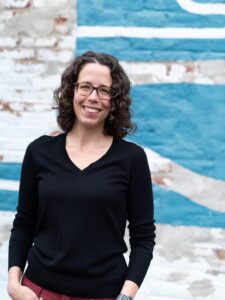 Publishing Talks started as a series of conversations with book industry professionals and others involved in media and technology, mostly talking about the future of publishing, books, and culture. It was great fun talking with people in the book industry about the evolution of publishing in the context of technology, culture, and economics.
Publishing Talks started as a series of conversations with book industry professionals and others involved in media and technology, mostly talking about the future of publishing, books, and culture. It was great fun talking with people in the book industry about the evolution of publishing in the context of technology, culture, and economics.
Later this series broadened considerably. In the past few years, I’ve talked with a variety of editors, publishers and others who have been innovators and leaders in independent publishing and bookselling in the past and into the present.
These conversations have been inspirational to me. I have had the pleasure of speaking with visionaries and entrepreneurs, editors, publishers and others who have influenced and changed contemporary literature and culture. I’ve also had the opportunity to speak with a number of friends and colleagues in the book business.
I’ve not had occasion to speak with the same person twice during all the years this series has gone on. But I really wanted to speak again with Jane Friedman, whose insights and knowledge I thoroughly respect, and get her sense of the current state of publishing and bookselling, especially as it affects writers and independent publishers. Our last Publishing Talks conversation was in 2015! Much has changed since then, and there was much for us to talk about.
Jane publishes a terrific newsletter I read religiously called The Hot Sheet. Her most recent book is The Business of Being a Writer (University of Chicago Press). Collaborating with The Authors Guild, she wrote The Authors Guild Guide to Self-Publishing. Her website offers a wide range of services and information for writers: “I report on the book publishing industry and help authors understand the business. I’ve been working in book publishing since the 1990s, but my views are not from the 1990s. Amidst rapid change in the industry, writers need honest and unbiased guidance to make the best decisions for their careers. I hope to offer you a signal amidst the noise.”
And I hope this conversation does the same.
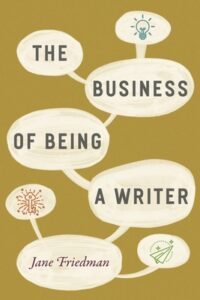
Podcast: Play in new window | Download

